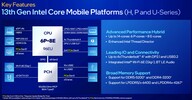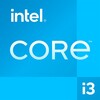AMD Athlon II N330 vs Intel Processor U300 vs Intel Core i3-1315U
AMD Athlon II N330
► remove from comparisonThe AMD Athlon II N330 is an entry to mid range dual core processor for laptops. Compared to the faster Phenom II and Turion II processors of 2010, the Athlon II N330 features only a 64 Bit FPU (Floating Point Unit), and not 128 Bit as the Athlon II Desktop.
The Athlon II N330 offers an integrated DDR3-1066 (or 800 according to Wikipedia) dual-channel memory controller and a 1.6 GHz HyperTransport 3.0 link (HT3200) to the chipset.
The performance of the Athlon N330 should be on par with a 2.1-2.3 GHz clocked Pentium / Core 2 Duo processor of 2009. First Passmark CPU scores are similar to a Intel Core 2 Duo T4300 with 2.1 GHz.
Intel Processor U300
► remove from comparison
The Intel Processor U300 is an entry-level mobile CPU for thin and light laptops of the Raptor Lake-U series. It was announced in early 2023 and offers one performance core (Raptor Cove architecture P-core, similar to Alder Lake) and 4 efficient cores (E-cores, Gracemont architecture). The P-cores support Hyper-Threading for 6 processing threads when combined with the E-cores. The clock rate ranges from 1.2 to 4.4 GHz on the performance cluster and 0.9 to 3.3 GHz on the efficient cluster. The per-clock performance of the E-cores should be similar to old Skylake cores (compare to the Core i7-6700HQ). All cores have access to 8 MB of L3 cache.
Performance
While we have not tested a single system powered by the U300 as of February 2024, its performance should be very similar to the outgoing Alder Lake Pentium 8505, since there is little difference between the two. The average U300 is set to be 10% to 20% behind the Ryzen 3 5300U and the Core i7-1185G7, as far as multi-thread benchmark scores are concerned, making the former an entry-level chip as of early 2024.
Your mileage may vary depending on how high the CPU power limits are.
Features
The integrated memory controller supports various memory types up to DDR5-4800, DDR4-3200, LPDDR5-5200, and LPDDR4x-4267. The Thread Director (in hardware) can support the operating system to decide which thread to use on the performance or efficient cores for the best performance. For AI tasks, the CPU also integrates GNA 3.0 and DL Boost (via AVX2). Quick Sync in version 8 is the same as in the Rocket Lake CPUs and supports MPEG-2, AVC, VC-1 decode, JPEG, VP8 decode, VP9, HEVC, and AV1 decode in hardware. Several PCIe 4 lanes (x8 for a GPU and two x4 for SSDs) as well as several PCIe 3 lanes are on offer.
The integrated graphics adapter is based on the Xe architecture and offers 48 of the 96 EUs (Execution Units) operating at up to 1.1 GHz.
Power consumption
The U300 has a base power consumption of 15 W, with 55 W being its maximum Intel-recommended Turbo power consumption. The CPU is built with a 10 nm process marketed as Intel 7.
Intel Core i3-1315U
► remove from comparison
The Intel Core i3-1315U is a mid-range mobile CPU for thin and light laptops based on the Raptor Lake-U series. It was announced in early 2023 and offers 2 performance cores (P-cores, Golden Cove architecture) and 4 efficient cores (E-cores, Gracemont architecture). The P-cores support Hyper-Threading leading to 8 supported threads when combined with the E-cores. The clock rate ranges from 1.2 to 4.5 GHz on the performance cluster and 0.9 to 3.3 GHz on the efficient cluster. The performance of the E-cores should be similar to old Skylake cores (compare to the Core i7-6700HQ). All cores can use up to 10 MB L3-cache. Compared to the faster i5 and i7 models, the i3 does not include vPro features.
Performance
Thanks to the 100 MHz higher Boost clock speed of the P-Cores, the i3-1315U should be slightly faster than the old i3-1215U.
Features
The integrated memory controller supports various memory types up to DDR5-4800, DDR4-3200, LPDDR5-5200, and LPDDR4x-4267. The Thread Director (in hardware) can support the operating system to decide which thread to use on the performance or efficient cores for the best performance. For AI tasks, the CPU also integrates GNA 3.0 and DL Boost (via AVX2). Quick Sync in version 8 is the same as in the Rocket Lake CPUs and supports MPEG-2, AVC, VC-1 decode, JPEG, VP8 decode, VP9, HEVC, and AV1 decode in hardware. The CPU only supports PCIe 4.0 (x8 for a GPU and two x4 for SSDs).
The integrated graphics card is based on the Xe-architecture and offers 64 of the 96 EUs (Execution Units) operating at up to 1.25 GHz.
The CPU is rated at 15 W base power (TDP, PL1) and 55 W max. Turbo power (PL2) and the whole SoC is manufactured in a further improved 10nm SuperFin process at Intel, which is known as Intel 7.
| Model | AMD Athlon II N330 | Intel Processor U300 | Intel Core i3-1315U | ||||||||||||||||||||||||||||||||||||||||||||||||||||||||||||||||||||||||||||||||||||||||
| Series | AMD Athlon II | Intel Raptor Lake-U | Intel Raptor Lake-U | ||||||||||||||||||||||||||||||||||||||||||||||||||||||||||||||||||||||||||||||||||||||||
| Codename | Champlain | Raptor Lake-U | Raptor Lake-U | ||||||||||||||||||||||||||||||||||||||||||||||||||||||||||||||||||||||||||||||||||||||||
| Series: Raptor Lake-U Raptor Lake-U |
|
|
| ||||||||||||||||||||||||||||||||||||||||||||||||||||||||||||||||||||||||||||||||||||||||
| Clock | 2300 MHz | 900 - 4400 MHz | 900 - 4500 MHz | ||||||||||||||||||||||||||||||||||||||||||||||||||||||||||||||||||||||||||||||||||||||||
| FSB | 3200 | ||||||||||||||||||||||||||||||||||||||||||||||||||||||||||||||||||||||||||||||||||||||||||
| L1 Cache | 256 KB | 464 KB | 544 KB | ||||||||||||||||||||||||||||||||||||||||||||||||||||||||||||||||||||||||||||||||||||||||
| L2 Cache | 1 MB | 3.5 MB | 5 MB | ||||||||||||||||||||||||||||||||||||||||||||||||||||||||||||||||||||||||||||||||||||||||
| Cores / Threads | 2 / 2 | 5 / 6 1 x 4.4 GHz Intel Raptor Cove P-Core 4 x 3.3 GHz Intel Gracemont E-Core | 6 / 8 2 x 4.5 GHz Intel Golden Cove P-Core 4 x 3.3 GHz Intel Gracemont E-Core | ||||||||||||||||||||||||||||||||||||||||||||||||||||||||||||||||||||||||||||||||||||||||
| TDP | 35 Watt | 15 Watt | 15 Watt | ||||||||||||||||||||||||||||||||||||||||||||||||||||||||||||||||||||||||||||||||||||||||
| Transistors | 234 Million | ||||||||||||||||||||||||||||||||||||||||||||||||||||||||||||||||||||||||||||||||||||||||||
| Technology | 45 nm | 10 nm | 10 nm | ||||||||||||||||||||||||||||||||||||||||||||||||||||||||||||||||||||||||||||||||||||||||
| Die Size | 117.5 mm2 | ||||||||||||||||||||||||||||||||||||||||||||||||||||||||||||||||||||||||||||||||||||||||||
| Socket | S1 | BGA1744 | BGA1700 | ||||||||||||||||||||||||||||||||||||||||||||||||||||||||||||||||||||||||||||||||||||||||
| Features | DDR3-1066 memory controller, MMX, 3DNow!, SSE, SSE2, SSE3, AMD64, Enhanced Virus Protection, Virtualization | DDR4-3200/LPDDR4x-4267/DDR5-5200/LPDDR5-5200/LPDDR5x-5200 RAM, PCIe 4, Thr. Director, DL Boost, GNA, MMX, SSE, SSE2, SSE3, SSSE3, SSE4.1, SSE4.2, AVX, AVX2, BMI2, ABM, FMA, ADX, VMX, SMEP, SMAP, EIST, TM1, TM2, HT, Turbo, SST, AES-NI, RDRAND, RDSEED, SHA | Thread Director | ||||||||||||||||||||||||||||||||||||||||||||||||||||||||||||||||||||||||||||||||||||||||
| Architecture | x86 | x86 | x86 | ||||||||||||||||||||||||||||||||||||||||||||||||||||||||||||||||||||||||||||||||||||||||
| Announced | |||||||||||||||||||||||||||||||||||||||||||||||||||||||||||||||||||||||||||||||||||||||||||
| Manufacturer | products.amd.com | ark.intel.com | www.intel.com | ||||||||||||||||||||||||||||||||||||||||||||||||||||||||||||||||||||||||||||||||||||||||
| L3 Cache | 8 MB | 10 MB | |||||||||||||||||||||||||||||||||||||||||||||||||||||||||||||||||||||||||||||||||||||||||
| TDP Turbo PL2 | 55 Watt | ||||||||||||||||||||||||||||||||||||||||||||||||||||||||||||||||||||||||||||||||||||||||||
| max. Temp. | 100 °C | 100 °C | |||||||||||||||||||||||||||||||||||||||||||||||||||||||||||||||||||||||||||||||||||||||||
| iGPU | Intel UHD Graphics Xe G4 48EUs ( - 1100 MHz) | Intel UHD Graphics 64EUs (Alder Lake 12th Gen) ( - 1250 MHz) |


 Deutsch
Deutsch English
English Español
Español Français
Français Italiano
Italiano Nederlands
Nederlands Polski
Polski Português
Português Русский
Русский Türkçe
Türkçe Svenska
Svenska Chinese
Chinese Magyar
Magyar
